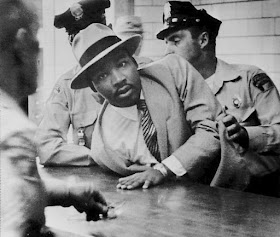 |
| Dr. Martin Luther King, Jr., arrested in 1958 for "loitering". [Source: AP] |
Since the early 1980s, the United States has celebrated Dr. King’s legacy each January with a day of remembrance, which in more recent years has become recognized as a day of service. Service defined the African-American civil rights leader, whose nonviolent social activism and involvement with the Southern Christian Leadership Conference contributed to the creation of the Civil Rights Act of 1964 and the Voting Rights Act of 1965, significant steps in the fight for racial equality in the United States. In 1964, King’s work was universally acknowledged when he became a Nobel Peace Prize recipient.
Today’s United States government may look favorably on Dr. King, but during the height of his activism, he was the definition of a threat to the status quo. In 1956, the Federal Bureau of Investigation (FBI) launched COINTELPRO, a domestic surveillance program initially designed to monitor and “neutralize” communist activity in the country. As the civil rights movement gained momentum, FBI Director J. Edgar Hoover turned the attention of COINTELPRO to activists such as Dr. King and wiretapped King’s hotel rooms and home and collected photographs and physical observations of his movements. Unable to uncover any punishable wrongdoing, the FBI instead used the discovery of extramarital affairs to attempt to anonymously shame King into abandoning the movement and committing suicide.
Flash forward half a century and it’s not hard to draw parallels between the work of Dr. King and that of today's Black Lives Matter activists. The now-ubiquitous hashtag #BlackLivesMatter originated in 2013 when neighborhood watch patrolman George Zimmerman was acquitted of killing an unarmed 17-year-old African American youth. Today, Black Lives Matter has come to represent a movement in response to continued police violence against Black people, as well as a call to rebuild the Black liberation movement.
And much like with Dr. King, a man who had done little wrong, today’s Black Lives Matters activists find themselves under surveillance. Since at least mid-2014, the U.S. Department of Homeland Security has monitored Black Lives Matter participants via social media and by tracking the movements of individuals at protests, cultural events and even prayer vigils. And given the current state of surveillance in the United States, the government is largely within its rights when it comes to documenting Black Lives Matters activists. Mother Jones explained, “Federal, state, and local law enforcement agencies have the legal authority to monitor people and activities in public places. This includes attending, observing, and taking notes on protest activities. However, collecting and storing personally identifiable information on specific individuals is not allowed, with the exception of people suspected of criminal activity. Monitoring tweets and other social media posts, including geolocation information associated with those posts, is also legal.”
One activist, Maurice Mitchell, sounded a bit Dr. King-like in his response to modern day government monitoring: “Surveillance is a tool of fear. When the police are videotaping you at a protest or pulling you over because you’re a well-known activist—all of these techniques are designed to create a chilling effect on people’s organizing. This is no different. The level of surveillance, however, isn’t going to stop us. After all, we organize because our lives depend on it.”
This MLK Day, we remember a man who lived and died for a cause he believed in, celebrate those who continue to advocate for justice in the face of danger and remind individuals everywhere to consider who might be watching them.
Want to know more about government infringements of citizens' rights? Read on!
- A Democratic Malaysia Requires "Creative Activism"
- Arrests in Ethiopia Remind Citizens to Protect Their Digital Footprints
- CISA: Not the Christmas Surprise We Had Hoped For
SumRando Cybersecurity is a South Africa-based VPN, Web Proxy and Secure Messenger provider. Surf secure and stay Rando!

No comments:
Post a Comment